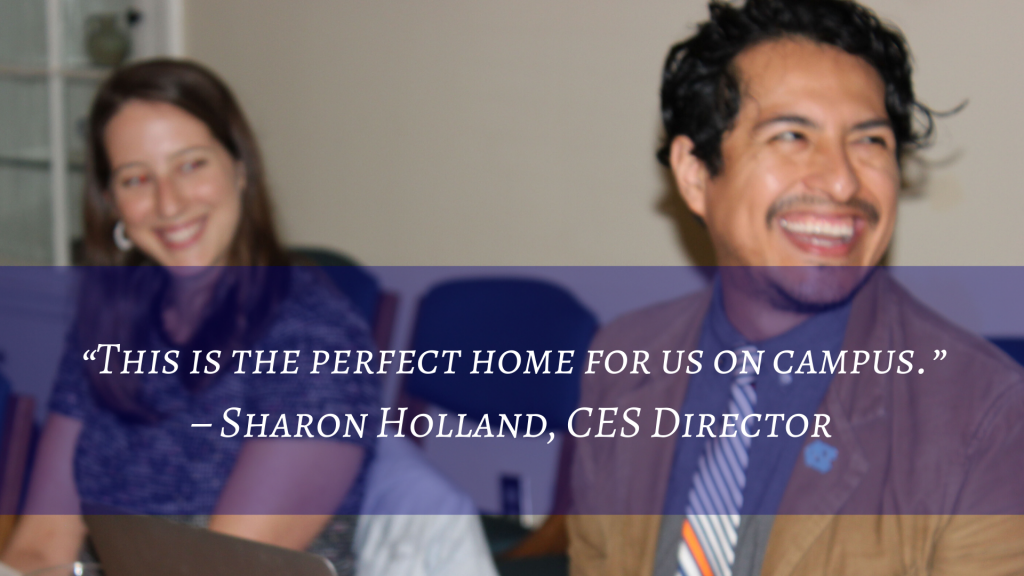Critical Ethnic Studies Graduate Working Group Fellows at Home in the Center for the Study of the American South
“We can no longer study groups in isolation or just in relation to the state. We have things to say to one another, and Critical Ethnic Studies allows us to do that.”
– Sharon Holland, CES Director

Doctoral candidates in the Graduate Working Group with CES Convenor/Director
“I really wish we had a space to talk about this,” Sharon Holland says she heard that wish more than once from colleagues and graduate students who wanted a space for research, funding, and intellectual conversations about the complex and nuanced definitions and issues of the South. “Now we have a structure.”
Holland, Director of the new Critical Ethnic Studies (CES) initiative at UNC and Townsend Ludington Distinguished Professor of American Studies, says the perfect institutional home for this collective is the Center for the Study of the American South (CSAS), where CES Graduate Working Group Fellows held their first work session in February. These doctoral candidates are committed to focused intellectual work on institutional power, systems of privilege and inequity, and the regional and global cultures that engage and survive them.
“This is the beginning of developing visibility in the region along with Southern Cultures who are expanding intellectual work and public knowledge, providing that kind of infrastructure on campus, providing a place for faculty with like-minded research interests to gather with graduate students.” Like essays featured in Southern Cultures, the award-winning journal at CSAS, CES promotes interdisciplinary conversations and frames the South in new ways.
 One of the goals of CES is a funded working dissertation writing group for students engaged in interdisciplinary work in the field. They improve on their dissertation chapters by discussing their work with their cohort. Topics discussed by the group of interlocutors at their first meeting showcase the multi-faceted interests and global context of their scholarly work. How Indigenous people in Ecuador use self-determination to adapt to change. An analysis of how multi-generational status functions among Puerto Rico’s migrant families living in New York and Florida. The ways memorials in Rwanda, Australia, and the U.S. South attempt to work against future mass violence. The use of community narratives to analyze how grassroots activism, among Native Americans and African Americans, acts in hurricane recovery in Robeson County, North Carolina.
One of the goals of CES is a funded working dissertation writing group for students engaged in interdisciplinary work in the field. They improve on their dissertation chapters by discussing their work with their cohort. Topics discussed by the group of interlocutors at their first meeting showcase the multi-faceted interests and global context of their scholarly work. How Indigenous people in Ecuador use self-determination to adapt to change. An analysis of how multi-generational status functions among Puerto Rico’s migrant families living in New York and Florida. The ways memorials in Rwanda, Australia, and the U.S. South attempt to work against future mass violence. The use of community narratives to analyze how grassroots activism, among Native Americans and African Americans, acts in hurricane recovery in Robeson County, North Carolina.
“I was interested in being a part of the CES Collective Graduate Fellowship because I knew my research would benefit from the community and the feedback of peers who are working on race and ethnicity from different disciplines,” says Lucy Britt, a doctoral candidate in Political Science.
“What are we to one another?” – Sharon Holland, CES Director
“Graduate students are the future scholars,” says Holland. “People are answering real hard questions, and CES provides scaffolding for answers with methodologies that work. Instead of asking which goal is more efficacious than the other, CES says we should be working with everybody. We can no longer study groups in isolation or just in relation to the state. We have things to say to one another and CES allows us to do that.”
The work of diversity and inclusion is no stranger to Holland and others on campus, but it takes a willingness to steer dialogue beyond the usual course.
“You cannot produce oral history or folkways studies of people if you don’t know their intellectual histories. Their culture is built on those histories. Critical Ethnic Studies teaches that there is a strong intellectual life in those communities.”
– Sharon Holland, CES Director
“You can’t hold conversation about diversity and inclusiveness in this community we call ‘the South’ without complicating the conversation,” says Holland. “We are moving the conversation forward about region, place, ethnicity, race, gender, sexuality, modes of belonging. We look at relationships people have that connect them to community and a life that is not necessarily dictated by the state. What are we outside of these structures? What are we to one another?”
Critical Ethnic Studies offers five to six fellowships per year. The initiative is working toward a certificate program and a post-doctoral position next year. Learn more about CES here.
“This is the perfect home for us on campus.” – Sharon Holland, CES Director

